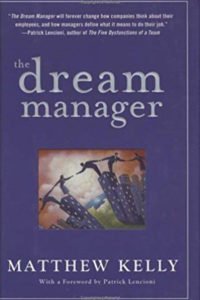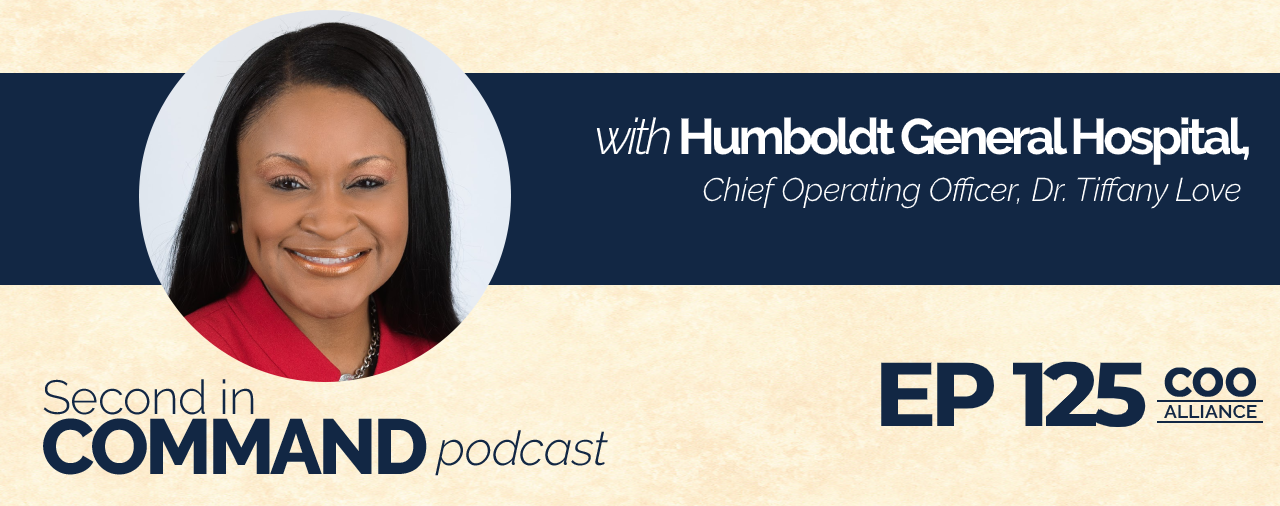Although Critical Access Hospitals are considerably small compared to others and usually found in the most remote places, its healthcare service is never subpar. Plus, it provides excellent opportunities for practitioners to grow and learn, particularly in the field of leadership. Dr. Tiffany Love sits down with Cameron Herold to talk about her experiences in the small yet exciting Humboldt General Hospital by serving as its COO. She details how she used her federal government learnings in dealing with the COVID-19 pandemic only a few weeks after she started working at the hospital. Dr. Tiffany also shares how to look at medical institutions from a business perspective and how she handles a continuously growing organization.
Resources:
Connect with Cameron: Website | LinkedIn
Get Cameron’s latest book: The Second in Command – Unleash the Power of Your COO
Subscribe to our YouTube channel – Second in Command Podcast on YouTube
Get Cameron’s online course – Invest In Your Leaders
—
Dr. Tiffany Love is a Chief Operating Officer and award-winning board-certified healthcare executive, Fellow, and former Regent to the American College of Healthcare Executives with over 26 years of healthcare experience. Love is recognized nationally and internationally as a leader in the advancement of women in diverse healthcare executives. She is the Chairwoman of the board of directors for the Healthcare Diversity Council and serves as a national keynote speaker and faculty for many prestigious organizations. She serves as coordinator, nurse planner, and guest faculty for the Harvard Medical School CME on career advancement, leadership skills for women in healthcare and faculty, judge and pitch coach for the writing, publishing, and social media for healthcare professionals.
Dr. Love also serves as a consultant providing executive consultation to many national organizations, including the Academy of Health Delivery System Science Fellowship Advisory Committee, National Institute of Health Center for Translation Research and Implementation Science, and the Executive Diversity Career Navigator with a passion for creating inclusive environments and healthcare researchers, executives, and the healthcare workforce. Dr. Love is truly dedicated to her career to promote, protect, and advance health equity in an inclusive environment for all. That was a mouthful. You’ve done a lot and are involved in a lot.
—
Tiffany, welcome to the show.
Thank you for having me. I’m glad to be here.
We connected via Instagram and there was something that jumped out over a post that you were mentioned in or that you had done. I don’t remember which it was and I noticed that you were the second in command and I reached out. You’re the second command for a hospital or a group. Can you walk us through what that is how you got involved in that?
This is a unique hospital. Humboldt General Hospital is a critical access hospital so it only has 25 beds and it’s in Winnemucca, Nevada. It also has a 40-bed skilled nursing facility but what attracted me to this role is that they have emergency medical services that cover a 10,000-mile radius. I’m talking about flight nurses and EMTs, who are trained in rope rescue, car extrication, and all of these amazingly wonderful things. They crossed state lines doing this work. That was one of the things that attracted me to this role.
I’m in Vancouver, Canada, now we have a hospital in Whistler that would be about the same size. When you say 25 beds that sounds small, but I’ve been in there a number of times with broken bones and you realize how complex it is with ambulances coming in and people being helicoptered off the side of the mountain. That place is busy.
Especially this time of year because people like to do the four-wheelers. They’re out in the desert doing all these stunts. The thing flips over and they’re injured. With COVID and people being locked up for so long, they’re even more adventurous. The injuries are more severe, so it’s been a busy summer for us.
Tell us how you got involved in the role of the COO there because it didn’t start out that way.
It did not. I was working in Maine as the Regional Chief Nursing Officer over two hospitals for Maine Health. I loved Maine but I did not want to stay another winter there. It was too isolated for me. I started to look around and I noticed this opportunity in Nevada. What intrigued me was that the CNO had the opportunity to serve as the CEO, so I said, “I would like to try that role. Maybe I’ll get a chance to serve in that capacity.”
During a series of interviews, I was made aware that the COO role was available, and this would be the first permanent COO. I expressed interest in it and the interim decided he was going to stay. By the time I was interviewed for the job, he had decided he was leaving again. I said, “What do I do? Do I interview for the CNO or the COO role?” He says, “CNO.” When they offered me the job, they offered me the COO role and here I am.
You moved and it is pretty much sight unseen from Maine to Nevada and came in as the COO from the group. What does the COO oversee?
I have a total of fourteen services. I have a pharmacy, information technology, diagnostics, laboratory, respiratory, cardiac rehab, physical therapy, speech occupational therapy, plant operations, nutrition and food service, wellness, and security.
How many people within the hospital?
This hospital has about 330 employees and I would say I supervise at least half of them.
There’s some perspective away. Twenty-five beds sound small but 330 is like, “There’s a company there.”
What I didn’t tell you is that when I first came into this role, the COO was also serving as the Director of HR. It’s like, “By the way, until we hire someone, you also have to serve as the Director of HR as well.” In my experience at the Department of Veterans Affairs, I had to work a lot with unions, so I learned labor laws and I felt comfortable serving as the interim Director of HR. They kept me busy for the first 30 to 60 days.
How so?
There were so many unexpected investigations. Unfortunately, I had to do a number of terminations. I had to hit the ground running as soon as I got here.

The Dream Manager
Your bio talks about diversity and inclusion, but you seem like a caring, empathetic person is one of the reasons that you’ve done well in your career?
I would say that because I honestly believe that in any leadership role, your ability to develop relationships that make you successful. When I’m working with my leaders, one of the first things that I do when I meet with them is I’ll meet with them one-on-one and I want to learn about who they are as a person and about their family. I don’t like to get into the nuts and bolts of their work until after I’ve given them the opportunity to tell me who they are as a person. I feel that having that initial step creates a solid relationship for the future.
Have you ever read a book called The Dream Manager?
I have not.
The Dream Manager takes what you’re talking about to the next level, which is almost even after you get to know them as a person. It’s deeply caring about their fears, insecurities, goals, and passions. If we can help them make their dreams happen, they’ll take care of the company for us. You’ll love it. It’s a great read. Is the hospital that you’re running a private hospital? Is it a for-profit?
It is a district hospital. We received tax dollars from the county and we have a publicly elected board of trustees. Can you imagine working with a publicly elected board? My experience in the federal government prepared me for this role because it’s political.
Do you have to report to a board, stay within a budget guideline, and run it as a business underneath that?
We are fortunate that, if for some reason, we have a financial shortfall, the tax dollars from the mining usually are enough to give us a safe cushion.
It’s nice to have that buffer. You said that you came into this role a few months before COVID hit.
I started here in January 2020 and I’m telling you, my days were 12 to 14 hour days, to begin with. All of a sudden, we started to hear that there were some concerns about China having cases of pneumonia. Before you knew it, we were told that we were experiencing COVID-19. First, it was an epidemic and now we’re dealing with a worldwide pandemic. I can remember that it definitely felt like standing in front of a tidal wave and waiting for it to hit and trying to prepare as best as you can but it’s literally preparing for the unknown.
As I can remember, I will come to work every morning, and I will pull up John Hopkins website to see the increasing number of cases and to see all those red blobs on the map and to watch them get closer to us until we have our first confirmed case. I hit a wall because I was so busy with the day-to-day operations and trying to build a structure for my organization. All of a sudden, you had to plan for a pandemic and we had to set up a field hospital in the Winnemucca Event Center that fortunately, we didn’t have to use.
Fortunately, we have a field hospital that we can set up and most hospitals don’t have that. Standing up into command, working closely with the county emergency manager, and having these day-to-day operations meetings with the county officials to determine, “Are we ready for COVID?” Preparing the hospital, creating a specific area within the hospital where we get house COVID patients away from our other patients. It was truly intense making sure that we had enough PPE. I will tell you that it was truly amazing the number of scams that will go on with people trying to sell us PPE. They want us to purchase a million masks for $250,000. It’s insane but we were all out there desperately trying to get as much PPE stockpiled because we knew there was a risk of running out. Who wants to tell your staff, “I’m sorry, I don’t have a mask for you?” “I’m sorry, I can’t provide you with the protection, you need to take care of these patients.”
This is a weird side question but how much waste do you think there is now in the system? Do you think we over-purchased across the board? Are hospitals running with pretty reasonable amounts?
We’re running with pretty reasonable amounts because we’re already getting that second hit. They say this is still the first wave. We have a PPE burn rate calculator. You go through PPE quickly when you think about having a staff 24 hours and you try to limit the number of people that go into the room. The equipment required, the PAPRs are expensive. Those filters are only good for sixteen hours.
They’re going out the door fast. I’m curious, coming in, getting your feet wet, getting to know the organization, and having to switch quickly almost into a wartime CEO where we got to get things done fast, do you think that helped you? Do you think that helps you get the command and control and all of a sudden be the leader? People are like, “We’ve got to get this done.”
I would say that my time in the federal government helps me focus on processes and create a new structure. That’s how I was able to jump in and get things done. I would definitely say I’m one of those leaders that you give me an assignment and I’m probably already giving myself a second assignment to match that assignment to make sure that it’s completely done. I had been in situations before where I felt like I had to go through the disaster drill. I was comfortable with its showtime. You’ve got to get in there and perform.
You’ve said the stuff you learned in the government a couple of times. I don’t think I ever heard people talk about the government that way. I’ve heard the opposite. It’s like, “I couldn’t wait to get out. I’m glad I got out. I would never go back.” What did you learn in some of your roles in the federal government, and how do you think that has helped you then?
As I was preparing for this, I thought to myself that my first second in command job was in the federal government as the Deputy Associate Director for Patient Care Services in Shreveport, Louisiana. That’s like a Deputy Chief Nursing Officer. Stepping into that role being responsible for over 500 FTE trained me and prepared me for this role.
You’ve lived all over the place too.

Critical Access Hospitals: A hospital’s number one goal is to care for the community. But at the same time, they can’t operate at a loss, or else they won’t survive very long.
I have. Let me say that I never plan to go into management. I’ve been working in a hospital since I was fifteen years old. I started out in dietary, became a nurse assistant, went to school to become a nurse, and I never planned to go on to be a nurse practitioner. I heard about a scholarship, applied for it, got it, and said, “I’ll go to school to be a nurse practitioner.” While I was in school, they tried to convince me to get my doctoral degree and I always say, “You can’t talk to the lady about having a baby when she’s in labor.” I wanted to get out of there. I wanted to be done with it.
A year later, I ran into someone and they said, “Why don’t you do your doctorate? It’s easy.” I said, “Okay,” and I went back to school. That was not true. It’s not easy but as I was finishing up that role, I was looking for a job where I could do research and clinical work. That’s when I looked at the Department of Veterans Affairs. I ended up in a population management type role, which was not exactly what I wanted but that was my introduction to management. I learned that you can rise through the ranks more quickly if you’re willing to relocate. I started out in Hudson Valley, New York, I have lived in Muskogee, Oklahoma and Shreveport, Louisiana. When I served in my deputy role, I had to detail assignments in Washington, DC which was exciting and also terrifying, and also an assignment in Philadelphia.
You lived all over. It’s amazing. I love that you did your doctorate as well. What did you do your doctorate in?
I did my doctorate in healthcare research, and I looked at how African-Americans experienced heart disease. I did a hermeneutic phenomenological study.
Can you give us any insight into why we’re hearing some of the narratives now of African-Americans having a higher incidence of COVID? Do you think it is genetic or more economic?
I will definitely say more economic. We talked about this a little bit in the media, but unfortunately, we have a healthcare system that has structural racism. You can look at the New England Journal of Medicine. They published a lot of articles showing how in a big city like Chicago if you look at those urban hospitals where you have a high population of minorities, those are the hospitals that don’t have as much funding.
They probably don’t get the ventilators or have the specialists that are needed to provide that expert tier. That’s one of the reasons. We know that people of color tend to work in essential jobs, whether it’s working as a registered nurse, a nursing assistant, and environmental services even. There are so many. It’s multifactorial, but it’s apparent that African-Americans are disproportionately affected and we do need to work on that.
At least it’s not a genetic thing. That was when I first heard that I was hopeful it wasn’t because I’d heard years ago, my grandfather owned a company that employed a lot of what we call First Nations or Native Americans in Canada. They had a predisposition towards alcoholism. I didn’t know whether that was a genetic thing or it was on the reserve. They were sitting and drinking. He was aware of it back before there was a narrative because all of his employees were Native American. Talk a little bit about the hospital and running it like a business. How does it operate as a business and how does it operate completely differently from a business?
The best example that I can give you is that we had an electronic health record conversion. Our number one goal is to be here to care for the community but at the same time, you can’t operate at a loss or you won’t survive long. When we converted to this electronic health medical record, a hospital that was doing financially well all of a sudden went from $8 million per month revenue down to $3 million.
The charges are built into the system correctly. I come in at a pandemic and during an electronic health record conversion. That’s got to be the worst combination of things. We’re constantly trying to identify charges that haven’t been built so we can go back and bill for services that have already been rendered. I got an email about how we were providing pain management services and the charges still aren’t built, and we have ten patients we’re seeing. Quickly, that turns into hundreds and thousands of dollars for that one service line for that one procedure that we’re missing and having frontline leaders who are astute enough to identify where the charges are missing.
It’s interesting how that can be missed so quickly too. You said something that I glossed over it at first, and I remembered. When you were going through some of the people’s issues, you said that you had to do some investigations and there were some people that had to be terminated. What was going on?
One of the first terminations that I had to do was pretty easy. There was a gentleman who was sleeping on the job and he works the night shift. He was the most pleasant gentleman you’d ever want to meet.
It’s easy to be pleasant when you’re well-rested.
He could not stay awake. This was the first time I’ve ever been involved in a termination where the person asked if he could have the supervisor who was terminating him. He realized that the job was not for him. I thought that was the most beautiful termination I had ever done. He was a great guy but he was not fit for the job. If ever there is a complaint of any type of harassment, we have to have a no-tolerance policy for any type of harassment. There were some issues along those lines that have come up where you have to be quick and timely in addressing it because if you don’t address that complaint immediately, it could easily turn into a multimillion-dollar lawsuit.
This is interesting to me. How many kids have you got?
One.
You don’t have this example. I’ve got two boys and there’s always another side to the story. When the older one comes and complains about the younger one I’m like, “Get the younger one here and I’ll hear their side.” You realize that both sides are true, so how do you deal with the whole complaint before you act on the older one for information. How do you get the rest of the story to know whether to act? Otherwise, it could be a lot of politics being brought in.
From the federal government, I learned how to do fact findings. You interview everyone who has knowledge of whatever events occurred. When you’re interviewing multiple people, there’s a common thread that you start to see, especially if there’s someone who truly is a harasser. That’s a behavioral issue. That’s the conduct issue and it doesn’t stop with one person. It is a pattern of behavior.
There is a little bit of smoking in the fire.

Critical Access Hospitals: Whenever you are coming into a new role, there is always a certain culture you have to observe and understand.
You identify the pattern to the point where that person cannot dispute it because there are too many accounts of people who have nothing to gain from being honest about the situation.
You often hear it in business, financial fraud, where someone in accounts receivable or accounts payable is doing something or stealing petty cash. Does it not happen in your industry at all or harder because it’s electronic medical records, etc.?
Yes, it does happen in healthcare. I have not experienced it myself, but I have a colleague who I value. I don’t want to give away who it was. I was taking a particular class and this person had gone into a hospital where they were asked to work on staffing and improving how they’re doing their staffing and help save money. Whether you’re understaffed or overstaffed, it can cost you either way. While she was there, she realized that the leadership team was getting paychecks for people who no longer work there or who had died. It was incredible and she felt lucky to get out of there with her life because she realized the scandal was so deep. It happens.
I used to love reading about those when I was a kid in the paper. I’m like, “Are you kidding? How do they not find this stuff? It’s incredible.” What’s the size of this city? I’m not even going to ask you to pronounce the name of the city you are in. You’re in northern Nevada somewhere. What’s the size approximately, in the population?
It’s a little over 7,000 people and it’s less than 2% African-American, about 20% Hispanic and the rest is Caucasian. The reason I love this little town is because this is the one place in the country where Google has decided that they can launch their Loon Balloons. They almost look like hot air balloons, but they send up these satellites that go into space. When Puerto Rico had the hurricane, they would send the satellite over there so they could get internet access.
They’re launching them from where you are?
From Winnemucca. Yes.
How often do you see them going up?
I haven’t seen one yet. I’ve only seen pictures.
I thought it was a daily thing. I’m like, “That’s amazing. I’ve got to go.”
I wish I could see one but they’ve offered if we ever had a situation where the internet went down, and we needed their help, they would come.
Let’s start with a reason to make it happen. How do you recruit great people from a base that’s small? Are you recruiting from Reno and Vegas and moving there? How are you grabbing them?
I am recruiting from everywhere. What is the way that I attract talent? Using recruitment firms, but honestly, I like to go on LinkedIn. I have had many people reach out to me on LinkedIn and recruit me from there. When I’m looking for talent, I rely on recruitment firms but also word of mouth. I still use that word of mouth. It’s helpful if you know somebody who knows somebody who’s interested.
How do you sell them into moving to a small town? This is a big issue for lots of companies. When they crack this code, they win because it doesn’t even have to be to a small city. Years ago, we were trying to recruit someone to move from Boston to Vancouver. We had to sell the candidate’s spouse in moving to the city. We had to sell somebody. I’m moving to a rainy city and moving to Canada from the US. There’s all these. How do you sell them into moving to a small town?
Number one, I would say if I could get them here to see it because we’ve got lots of fun toys. That’s one of the things I love about this place is the emergency medical services we provide. Usually, if I can get them here, it’s a beautiful hospital. It looks like it’s brand new. I pretty much can sell them there. Also, people are looking for opportunities. We’re looking for someone who is hungry to get that next opportunity and that usually is what it takes to recruit someone like myself. I’m looking for someone who’s going to give me the chance to do what I know I can do.
Do you sell them on lifestyle or cost of living?
People who live here like to hike and camp. If that’s what they’re into. Me in particular, that wouldn’t have sold me.
Are you not out four-wheeling and fishing?
No, but it’s a cute little town. As I was driving to work, one of the police waved at me. I know the sheriff and the captain of the police. We all know each other. It’s a great place to live. I thought I was going to take it easy when I moved here. No. I’ve been busier working here than I have when I was responsible for two hospitals. There’s no such thing.

Critical Access Hospitals: You have to get involved in politics if you want to ever see any real change, even though you don’t like it very much.
Tell us about when you’re starting and when you came in as a COO? How did you get your feet wet? What were you doing in your first 30, 60, and 90 days up until the COVID part where everything shifted? How are you integrating yourself and getting to know the business and the people?
I have my hands full. I have a bunch of leaders who this is the only place that they’ve ever worked. Number one, I’m a process focused person so sitting down with them going over what their current issues and challenges are. It’s easy to quickly pick them up because a lot of times, they haven’t put any formal processes in place. When you ask them why they do what they do, they don’t have it. This is one thing that I do at every organization that I go to. If you run a policy for me, I need to have references. How did you determine that these are the steps that need to be taken in order for the proper outcome? Most people don’t think like that. That’s the first thing I do. I come in, I look at the policies, and go from there.
How did you get to know them? How’d you get them to know you?
I tried to be open, upfront, and honest. I don’t know any other way to be. If someone is doing a great job, I’ll tell them that they’re doing a great job. If someone is having some challenges, we need to sit down and talk about expectations. I always like to give them an opportunity to turn things around. For instance, I come in because I’ve come into situations where half of my leaders need to resign or be let go.
You don’t come in with that attitude but you come in, “Let’s see what we have here. Let’s set these expectations.” If I see they’re struggling, I will try, help, and walk them along on how to get things done differently because a lot of times, if they’ve never worked anywhere else, they don’t know another way. Sometimes they need someone to walk them through the steps to give them more direction. There are some leaders that got that.
It’s so similar to being a parent. You don’t need to go through 360 feedback and quarterly reviews. You tell people that they’re doing great, where they need to improve, and you treat them as humans. Leadership is so much simpler than we make it to be.
I always say, “If you hold people accountable to do the job they were hired to do, they’re either going to improve performance or they’re going to self-select out.”
The self-select out part is interesting, too. Where have you struggled in your role as a leader and as a COO? What have you had to work on yourself?
Whenever you’re coming into a new role, there is a culture. In rural hospitals, it’s always delicate. You have to come in, and you have to sit back, observe, try, and understand what the culture is. Coming into this culture here, one of the things that I had to learn to do was to, if I know the answer at the beginning of the meeting, don’t necessarily put it up there. Wait and let things progress. At the end of the meeting, say, “You know,” and deliver. My boss said, “Right at the beginning of the meeting, you didn’t give them a chance to state their case for this or that.”
I’m a bottom line up front type person, so a lot of times in a smaller community, that’s not well received. I would say, softening my approach, taking a different approach, and I always like to start by asking the question. That’s the strategy I’ve always used. I already know the answer or think I know the answer so I will start to ask questions until either one reveals what I thought, or number two, maybe it surprises me in the answers a bit different than what I expected.
What you touched on there is something I’ve been talking about for years now. The leader’s job is to grow people, not to give all the answers. If our job is to grow their skills and their confidence and we’re always speaking first, we’re never giving them a chance to give their answer. Half the time, their answer is the right one or the one we would have selected, or as you said, it’s another one that’s like, “That’s pretty good too,” which raises their skills and confidence. It’s our job to speak last at every meeting, which is tough to do when we’re going fast. You’ve had to work on that. What are you working on now with your skills? Is there anything that you’re working on learning and thinking about to grow?
Every year, I plan continuing education for myself. I decided that I wanted to do the public leadership certification through the Harvard Kennedy School. I started the class in January 2020 or so and COVID hit and I stopped. I’m getting back into getting that formal certification working on policy. As much as I don’t enjoy politics, you have to get involved in politics if you want to ever see any true change.
That’s a lot of work. In terms of growing people, how do you grow the people in the organization? How are you growing your direct reports?
What I love to do is I’m a board-certified healthcare executive through the American College of Healthcare Executives. Typically, when you go into smaller organizations, you’re dealing with leaders that have had no formal management training. In the past, what I have done was to take it upon myself, to sit down with my leaders once a month and go through those core competencies of a healthcare executive.
What are they?
Going over human resources, finance, and all of those areas that we all need to know so we can be successful. I find that a lot of people don’t ever get that formal education so I start to try and deliver that. I haven’t had a chance to do that in the formal way that I like to because of COVID. I don’t want to push them over the edge. I have leaders who feel as if they’re drowning. It’s trying to slowly ease into that now. We’re trying to take little snippets of it. There was a situation that came up and I realized that our leaders don’t understand FMLA. Family Medical Leave Act. It’s taking little snippets of that and providing that at the supervisor’s meeting. We’re trying to hit the things that could cause vulnerability for the organization and try to teach them those basic things that every leader should know when you’re managing other people.
There’s a lot of complexity in that stuff, too.
There is so you’ve got to start somewhere.
You talked earlier about being open and vulnerable or being yourself as well as a leader. That probably gets even more magnified working in a small town environment where they see you out on a Saturday at the grocery store and they see you out at a local event, or the movie theater, or whatever. It’s almost the social media fishbowl. You’re open and vulnerable. Are there any changes there that you’ve seen versus prior roles or prior cities?

Critical Access Hospitals: True happiness can be attained by serving others and seeing the impact you deliver in their lives.
I would say Louisiana taught me the most about being in a rural community where I will be at the grocery store, people will walk up, and hug me. It’s getting used to people who you may not know, but they feel they know you, so they want to engage with you, which is why I tried to go to the grocery store early in the morning because otherwise, I would never get out of there. Especially when you’re seeing people in scrubs all day and you see them in the grocery store. You’re like, “I’m so-and-so. I’m the anesthesiologist.” You’re like, “Yes. I remember.” You usually see them all covered up. That is what is important to people in small rural hospitals. They want someone who wants to be a part of the community, who goes to church every Sunday with them, and who is at the local Walmart with them.
I grew up in a city that was a little bigger, not massive, but is what 85,000 people. I remember that every time I went to the grocery store bumping into someone. I did like it. There was a sense of community, familiarity, and belonging that was nice. When I’m in these big cities, I almost wonder, “Will I see someone in the grocery store?” I’m hoping to bump into somebody in the grocery store. I would like that environment as well but I get the point. I would probably be grocery shopping at 7:00 AM as well.
Otherwise, it’s hard to get out of there. I always stop. I always take the time to engage with people.
Do you let your hair down and be you or do you always have that professional Tiffany or your Dr. Tiffany Love on as well?
No. People like to see that vulnerable side. They like to feel like you are human. It is what it is.
Jeans, a t-shirt and a baseball cap and you can go out and grocery shopping in a small town.
Not quite.
You still watch that a little bit.
I have to be careful with that.
It’s interesting because, on social media, I’ve decided years ago to be like, “Screw it.” I need one place where I can be me. It’s probably two now. It’s Facebook and Instagram where I’m posting stuff. I’m like, “I don’t care.” I need to at some point be a human in this whole life that we’re going through and if I have to always have this persona on my website version of me all the time, I don’t want that. I’ve got a woman who works for me in social media and she’s like, “You can’t post that.” I’m like, “I can. I need to.”
With COVID, I have posted some personal posts. Since I’ve been living here in Nevada, I have been struggling with altitude sickness where my oxygen drops down to 93 or 90. When it first happened to me, I thought I had COVID because I had been exposed to a colleague who had it. When I went to go get my COVID test, they checked my oxygen and it was only 93%. I was mortified. I’m like, “I’m dying.” I had to be quarantined for a week. My staff was so worried, wanting to come to check on me, bring me oxygen, and whatnot. I thought, “I’m going to be okay.” That’s when I started to post more personal things on social media because I have friends who I had been within January 2020 in New York. Some of them had COVID and had overcome that. People need that intimacy when you’re in quarantine.
It’s great when leaders do. I had someone on the Second in Command Podcast, Matt from Rippling and he was saying that he gives people his Operating Manual for Matt. He’s got a 4 or 5-page document that describes him as a human and as a leader, so they get to know this quirky dude who’s going to be their COO. I’m like, “That’s such a great idea.” He’s throwing it all out there and going, “This is me.” Dr. Tiffany Love, final question. If you were going to go back to your 22-year-old self, graduating from nursing or getting started on your career, what word of advice would you give yourself back then that would be true now that you wish you’d known when you were younger?
Live a life of service. I would say when I am giving, doing for others, I’m mentoring and sponsoring, that is when I feel most alive and happy. It’s when I’m doing something for someone else and I can see the benefit to their life. That’s priceless.
I’ve had 120 guests on the show and that’s the first one that’s ever come across as service for others. That’s nice.
It’s amazing to see how people can grow when you give them a little support.
It also makes you feel good when you’re doing it, right?
Yes, it does.
Dr. Tiffany Love, the Chief Operating Officer from Humboldt General Hospital in Nevada, thank you so much for sharing with us on the Second in Command podcast.
Thank you for having me.
Important Links:
- Dr. Tiffany Love – LinkedIn
- Healthcare Diversity Council
- Harvard Medical School CME
- Humboldt General Hospital
- The Dream Manager
- Facebook – Cameron Herold
- Instagram – COOAlliance/Cameron’s Biz
- Matt MacInnis – Past episode
About Dr. Tiffany Love

Dr. Tiffany A. Love is an award-winning board-certified healthcare executive, Fellow and former Regent of the American College of Healthcare Executives (ACHE) with over 26 years of healthcare experience. Love is recognized nationally and internationally as a leader in the advancement of women and diverse healthcare executives. She is Chairwoman of the Board of Directors for the Healthcare Diversity Council and serves as a national Keynote Speaker and faculty for many prestigious organizations. She serves as coordinator, nurse planner & guest faculty for the Harvard Medical School CME on Career Advancement Leadership Skills for Women in Healthcare and faculty, judge, & pitch coach for the Writing, Publishing, and Social Media for Healthcare Professionals.
Dr. Love also serves as a consultant providing executive consultation to many national organizations including Academy Health Delivery System Science Fellowship Advisory Committee, the National Institute of Health Center for Translation Research and Implementation Science and the Executive Diversity Career Navigator. With a passion for creating inclusive environments for healthcare researchers, executives, and the healthcare workforce, Dr. Love has truly dedicated her career to promote, protect and advance health equity and an inclusive environment for all.





